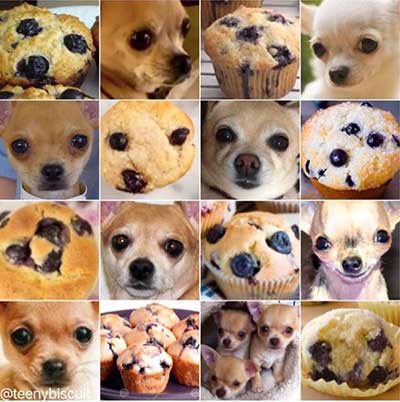Difference between revisions of "Chihuahua or Muffin?"
| Line 103: | Line 103: | ||
[http://www.labsix.org/physical-objects-that-fool-neural-nets/ Fooling Neural Networks in the Physical World with 3D Adversarial Objects]<br> | [http://www.labsix.org/physical-objects-that-fool-neural-nets/ Fooling Neural Networks in the Physical World with 3D Adversarial Objects]<br> | ||
[http://ssbkyh.com/works/cloud_face/ Cloud Face]<br> | [http://ssbkyh.com/works/cloud_face/ Cloud Face]<br> | ||
| − | |||
[https://github.com/CMU-Perceptual-Computing-Lab/openpose OpenPose]<br> | [https://github.com/CMU-Perceptual-Computing-Lab/openpose OpenPose]<br> | ||
[http://densepose.org/ DensePose]<br> | [http://densepose.org/ DensePose]<br> | ||
Revision as of 08:52, 12 January 2020
Elective - Chihuahua or Muffin?
Tutors
Brigit Lichtenegger
Javier Lloret
Arjen Suijker
Special Guests
Florian Cramer
Lotte Klompenhouwer
Yves Gellie
Description
The recent developments in the field of Artificial Intelligence and Machine Learning are opening up new possibilities but also presenting new challenges and ethical dilemmas.
AI systems are now capable of synthesize realistic portraits, psychedelic imagery, harmonic melodies or intriguing narratives. These systems are also used to make predictions based on data in wide ranging fields. They guess the words we are about to type, the songs or tv shows we might like or the content of a picture. But they are also used to determine whether we would commit a crime or pay back a loan, often perpetuating human prejudices.
In this elective, students will be introduced to Artificial Intelligence and Machine Learning through a series of lectures, presentations, hands-on workshops and discussions.
What is the current state of AI? How do these technologies work? How does a neural network learn from data? And most importantly, can these systems distinguish chihuahuas from muffins?
Learning Goals
- Demystify and achieve a basic understanding of a series of terms in the domain of this course, including: AI, bots, machine learning, neural networks, singularity and computer vision.
- Have an overview of the possibilities that these techniques offer for artistic creation.
- Reflect on these current technological developments and their application to other fields connected to scientific and technological innovation.
- Develop a critical mindset questioning the impact of these developments in our society.
- Get familiar with a broad range of machine learning open source tools and frameworks that have been extensively used in recent years.
Final assignment
- Work on a project in which you inspired by the current developments of AI and Machine Learning.
- Free Format
- The project presentations will take place on Friday (January 17).
- You will have 5 minutes to present your project + 5 minutes to answer some questions.
Planning
Week 1
Monday
AI and Machine Learning: Background history, philosophy & the Turing Test with Brigit Lichtenegger.
Tuesday
Theory Session on Neural Networks. Workshop Classification with Arjen Suijker.
Wednesday
Convolutional Neural Networks with Javier Lloret.
Thursday
Ethics + Datasets with Javier Lloret. With invited guest speakers Florian Cramer & Lotte Klompenhouwer.
Friday
Generative Models and Reinforcement Learning with Javier Lloret + Screening of the short film “The year of the robot”, with an introduction from the director, Yves Gellie.
Week 2
Monday
Natural Language Processing and Project proposal feedback with Brigit & Javier
Tuesday
Assignment time
Wednesday
Assignment time
Thursday
Assignment time
Friday
Presentations with Brigit, Arjen & Javier.
Tutorials
Image recognition with Google Teachable Machine
Image recognition with YOLO with Darknet
Deep Dreams: Deep Dream with Darknet
Terminal basic tutorial: https://maker.pro/linux/tutorial/basic-linux-commands-for-beginners
Generating images using GANs DCGAN
Pix2pix: Online demo of Pix2pix
GauGAN: Online demo of GauGAN
Training a Neural Network how to play Pong: Pong
Generating text using a "Recurrent Neural Network" RNNs with Darknet
GPT-2: GPT-2 Language model
Recommended readings
Cathy O'Neil - Weapons of Math Destruction (2016)
Florian Cramer - Crapularity Hermeneutics (2018)
Lev Manovich - AI Aesthetics (2018)
Safiya Umoja Noble - Algorithms of Oppression. How Search Engines Reinforce Racism (2018)
Inspiration
Geert Mul - Match of the Day (2004 - ongoing)
Obvious - Edmond de Belamy (2018) -> AI Painting sold for 375000 Euro
Helen Knowles - The trial of Superdepthunterbot (2016)
Oscar Sharp + Ross Goowin - Sunspring (2016)
Other resources
Image processing / Object recognition
quickdraw with google
How Many Computers to Identify a Cat? 16,000
what neural nets see
Fooling Neural Networks in the Physical World with 3D Adversarial Objects
Cloud Face
OpenPose
DensePose
GANs
biggan
biggan implementations
progressive growing of GAN's
Conditional GANs
Pix2pix
Vid2vid
CycleGAN
BicycleGAN
AttnGAN
StackGAN
AI & Ethics
New AI can guess whether you're gay or straight from a photograph
OpenEth Computable Ethics
Why Self-Driving Cars Must Be Programmed to Kill
AI picks up racial and gender biases when learning from what humans write: There is no objectivity
Natural Language Processing + Speech Recognition
Algoliterary Bibliography
owow bots
Speech Recognition and Deep Learning
neural network generated recipes
Online Courses
Machine Learning for Artists
coursera deep learning classes
Misc
Timo Arnall - Robot Readable World
2 Minute Papers
ai experiments
Deep Learning is not the AI future
Future of Life Institute
NPU chips in intelligent phones
The FRIEND-Browser
Googlism
mrpimpgoodgame.over
